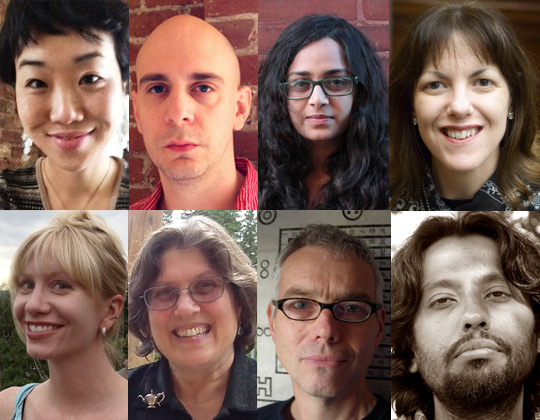Recently Manhattan’s peerless and endlessly vibrant 92nd Street Y released thousands of recordings of events held there over the years in honor of the institution’s 75th anniversary. I have only just begun to delve into the trove of offerings, but I have the following recommendations to make —
Monthly Archives: December 2013
Reza Ghasemi’s third novel, The Spell Chanted by Lambs, was initially published in installments under the title of Madman and the Moonpars Tower on the author’s personal blog in 2002 as a reaction to censorship, making Ghasemi the first Iranian writer to turn to the Internet in the face of artistic suppression. It took six years to be traditionally printed by the Paris-based Khavaran Publications, and still five more years to be translated into English by novice translator Erfan Mojib. Says Mojib: “Ghasemi admits that he’s not aware of the existence of [online narrative] in other languages and is sure of [its] nonexistence in Persian literature, as he calls it the first Iranian ‘online novel’ and sarcastically labels the term as one of his own bastardizations.”
A poet of non-poetic things, Sun Wenbo drops himself into the mine of his subject and then starts tapping on the walls around him to find a way to tunnel out. This is the tension that undergirds his work, whether the poet’s intellect will manage to make its way back to the surface. His lines are sinewy but vernacular, sometimes verging on chatty, with moments of startling grace. He has read and absorbed the greats of Chinese literary history, and he writes as much to Du Fu as to his contemporaneous readers. His oeuvre as a whole presents a poet passionately concerned with words above all, but also with history and politics, the metaphysical and social realms, philosophy, love and its failures. When judging their peers, Chinese writers tend to be concerned not only with a poet’s output, but with his or her attitude toward the work of poetry. Sun Wenbo ranks among the most focused and intent. He has a scholar’s force of concentration and a soldier’s determination.
Weekly News Roundup, Friday 6th December 2013: Year-end Lists, Translation Awards, R.I.P. “E”

A look at some of the most important literary news of the past week
It’s that time of year again. If you’ve got a pulse and an Internet connection, chances are you’ve caught sight of the New York Times’ 100 notable books of 2013 list (or its more selective 10 best books of 2013 list). If you’re sick of a format that’s become journalistic junk food, you might have tested NPR’s addicting 2013 Book Concierge app instead. And if you’re craving a more global bent, The Independent rallies the best-translated fiction of 2013. These roundups are nice, but Scott Esposito’s survey of contenders for the 2013 Best Translated Book Awards over at Three Percent is more our style, featuring work by Asymptote contributors Mircea Cartarescu and Laszlo Krasznahorkai.
Here at Asymptote we have an extraordinary team of editors from all corners of the world. When they’re not busy translating or commissioning work for the magazine, they do many other amazing things which we would like to share with you in our monthly news roundup.
Since I began publishing translations in Slovakia in 2011, I am often asked the same question: Why start a publishing house when there are so many different options and people are so distracted by new technologies that they do not have time to read anyway?
Nao-cola Yamazaki’s first published work, 2004’s Don’t Laugh At Other People’s Sex, won the Bungei Award, was adapted into a major motion picture, and was nominated for the Akutagwa Award, a prestigious honor given annually to a promising Japanese writer. “I believe that the mission of contemporary Japanese writers is to express ambiguity,” she says, as an introduction to the following piece, an excerpt from her novel The Beginning of the Long End. Yamazaki was a participant in the 2013 Writers Omi at Ledig House Translation Lab, along with the translator of this piece, Takami Nieda. Yamazaki, who has in the past been skeptical that her work would be translatable, found her views altered by her time at Ledig. “The Japanese have always had a tendency to celebrate ambiguity as a virtue,” she writes, and “the Japanese language itself seems to be suited for expressing ambiguity… For example, it is possible to construct sentences without a subject, there are many passive expressions, and sentences can be written without specifying an object. These are some of the characteristics of Japanese that differ from English and perhaps many other languages.” Though she recognizes how her work takes advantage of the nuances of her native tongue, Yamazaki completed her stint at Writers Omi believing that a translation that conveyed her fascination with vagueness would maintain some of its distinct qualities, and “perhaps those reading the translation might enjoy those elements as a kind of ‘Japaneseness.’”
When Beckett translated his own En Attendant Godot into Waiting for Godot it was an act of editing as much as anything else. Some of his changes were quite normal for a translator (the selection of the best words, the retention of the play’s themes and shape and humor) and some unique to the self-translator: reworking passages, adding phrases (a whole back-and-forth of cursing, for instance), cutting speeches. The French is riddled with rien; the English with ‘nothing.’ In one of his many amusing alterations he turns phoque (the French word for seal, which sounds like the English cuss ‘fuck’) into ‘grampus,’ which is an obscure English word for dolphin that sounds, if pronounced like a Frenchman, like a small turd. READ MORE…







